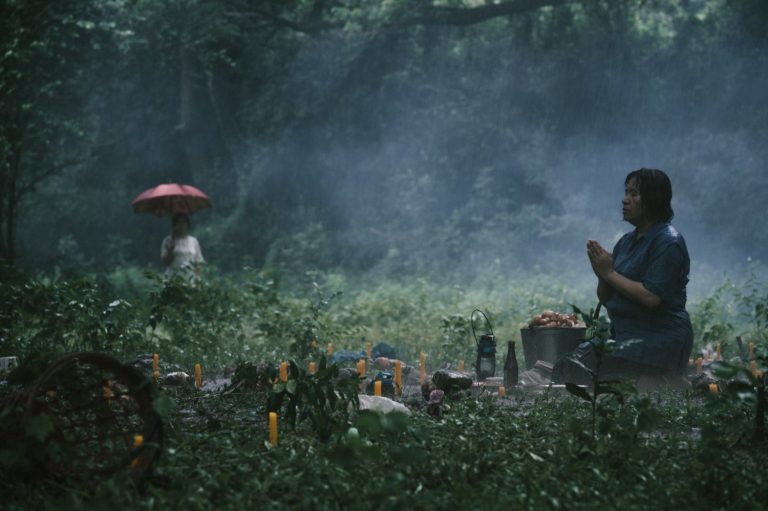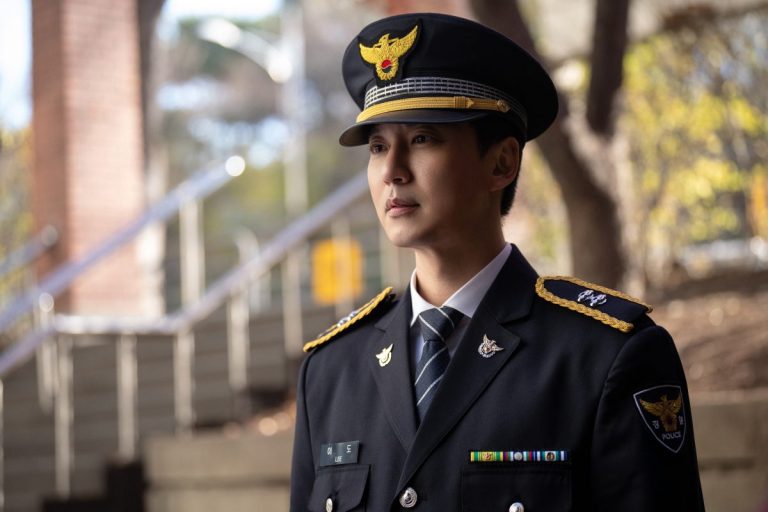Fire on Water (2024) “IFFR” Movie Review: Karthi glances at his hands, which are swollen and painful. He examines the structure of his palm and fingers, where he sees a pain larger than the redness – tribulation. A leaf gradually falls onto his palm, which is somewhat imperfect and covered with white patches all over. He draws a parallel between himself and the leaf, seeing the physical structure as a metaphor for his own internal suffering. He realizes at that point the decaying matter relates to how deteriorated his inner strength has reached, which shakes him up instantaneously.
In recent times, Malaysian filmmakers have been enjoying a period of great success. A handful of films from Malaysian filmmakers, such as “Tiger Stripes” by Amanda Nell Eu and “Maryam” by Badrul Ismail, have brought forth elements of innovation and boldness. Within the same context, director Sun-J Perumal presents a vital subject matter through his film “Fire on Water.” Beyond being essential and daring, it is staged in such a way that it pulls us in thoroughly.
The film opens with the protagonist, Karthi, who has a million issues to complain about but chooses to remain silent. Karthi shows signs of discomfort that reach a concentrated form of dissatisfaction. He works as an assistant but often feels out of place within the circle of the filmmaking crew. At this point, viewers will begin to grasp the magnitude of the mystery that has been occupying Karthi’s mind for some time. The issue connects to the negativity of commercialism in the Malaysian Tamil film industry.
The filmmaker showcases several aspects in which the pervasive commercialism that has nearly taken over the country undermines realism in films. An excellent example is a scene in which Karthi becomes irritated with an actor’s lines while filming. Fully loaded with mass-oriented details and catchy phrases, the intense typicality of self-glorification to portray masculinity in films affects the notion of realism that Karthi believes in. Being an ambitious filmmaker, Karthi wants to work independently with the goal of creating genuine movies inspired by true stories. The difficulties of reaching his dreams form the crux of the film.
Audiences are also exposed to the ripple effects of exploiters within the producer community. In an effort to enlighten his audience, filmmaker Sun-J Perumal revisits the early days of Malaysian film production enterprises. What fascinates me here is the detailed exploration of two different individuals (producer and amateur filmmaker) wanting the same aspect – recognition. On one side, we witness a younger Karthi who works as an intern for producer Mazhaikannan in his company. Despite receiving a lower income, Karthi works tirelessly to get sufficient working experience and establish a strong reputation for his future in filmmaking.
On the other hand, Mazhaikannan assures Karthi that he will have a productive pitch session for Karthi’s script and assures him a glowing recommendation. As one person follows his heart to achieve his goals, another person takes advantage of a situation to further his own interests. The filmmaker wants the viewers to resonate with the feeling of betrayal as part of the ‘experience package’ among aspiring filmmakers in Malaysia. Yet, we also see things from the explorer’s perspective, which helps us understand the producer’s divisive weight in his pursuit of fame.

In Karthi’s romantic life, too, we see elements of complexity. Shuba, Karthi’s partner from the college times, loves him for the way he is. Despite the challenges, Shuba, on her quest to comprehend Karthi’s unique dreams, learns their connection remains strong. Yet, it is also difficult to fully understand Shuba’s fickle decision-making as to what drives her relationship requirements. At first, she wants him to settle for a 9 to 5 job due to commitments. Later, she wants him to focus entirely on his dream profession because it represents Karthi in his truest form. Here, director Perumal directs us to individuals who are unable to understand the rocky roads of a filmmaker’s journey. After committing to a profession that requires one’s undivided attention and unwavering determination, it can be nearly overwhelming for both partners to give in to love.
Pechaiye (aka Peggy) enters Karthi’s life unannounced when they are both at rock bottom. In this moving segment, filmmaker Sun-J Perumal uses uplifting analogies and values to refocus the film on the importance of life preservation. Viewers are presented with numerous occasions that are linked to philosophical and artistic touches, which serve as moral guidance for embracing life’s various obstacles. Peggy opens up to Karthi about her romantic struggles, and he gives her an insight into his own turbulent path to becoming a filmmaker.
What follows is a constructive discussion of both of their perspectives. Peggy and Karthi’s discussion takes on a therapeutic tone as they work through their mental challenges, clearing their minds of uncertainties and confusion. Aspects of love, aspiration, life goals, personal traits, and despair are conveyed metaphorically between them. Also, there are some notable quotes in the film that the filmmaker showcases with respect to nature. Through its poetic language, spoken lines, and visual storytelling, the film emphasizes the power of nature to evoke human emotions.
Karnan Kanapathy, who plays Karthi, makes his character relatable to the viewers even through his silence. At times, viewers would just have to follow Karthi’s gazes and sudden pauses to grasp his thoughts. Rubini Sambanthan (Peggy) does an admirable job capturing the essence of a troubled yet independent Tamil woman despite her limited Tamil proficiency. The screenplay by Sun-J Perumal and Sivanantham Perianan effectively communicates the film’s theme to the audience.
Several unanswered questions arise in my thoughts as the film unfolds: Is the memory of Karthi’s grandpa an inspiration for him to achieve his goals? Has Karthi’s parents’ unwavering support for his career a hope he carried with him every time he felt lost? Are audiences still looking for commercialism as part of the filming choice, or is it merely the industry’s inability to revolutionize themselves? Are prospective filmmakers attempting to conform to societal norms in the hopes of being accepted into the industry? Is Karthi’s concept of the ‘Golden Turtle’ a representation of optimism or a dissection of illusions?
“Fire on Water,” which was selected at IFFR this year, is a soulful film that gives a 360-degree perception of how individuality can break a person into pieces when placed in a biased spectrum of acceptance. The film showcases the absolute shortage of independent and realist films in the Malaysian Tamil film industry. Almost personal and mostly impactful, filmmaker Sun-J Perumal takes us on a journey of acceptance toward understanding the truest form of cinema. Whether through Karthi’s emotional journey or the inspiring dialogues, the film’s heart and soul are definitely in the right place.

![For Your Consideration: Baskin [2016]](https://79468c92.delivery.rocketcdn.me/wp-content/uploads/2016/12/BASKIN-still-1-768x432.jpg)




